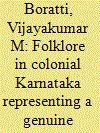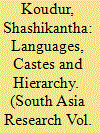| Srl | Item |
| 1 |
ID:
140100


|
|
|
|
|
| Summary/Abstract |
This article offers a comparative study of the multiplicity of folklore scholarship in Karnataka during the colonial period, revealing multiple layers of knowledge, experience and interculturality. It concentrates mainly on viewing three specific collections of Indian folklore by different agents, both colonialists and locals. The overarching aim is to achieve a deeper understanding of various research methodologies and their influence. This article also seeks to address some subsidiary questions regarding the prominence given to oral literature during the second half of the 19th century. It examines what relations, specifically in the eyes of the coloniser and the colonised, it shared with the classical/ancient works of literature of India and seeks to assess the nature of folklore knowledge produced in colonial Karnataka.
|
|
|
|
|
|
|
|
|
|
|
|
|
|
|
|
| 2 |
ID:
172209


|
|
|
|
|
| Summary/Abstract |
In the former South Kanara or south coastal Karnataka region, the presence of overlapping languages, mainly Tulu and Kannada, posed prolonged dilemmas in the nineteenth century for the Basel Mission. The choice of language was important for their evangelical work, supported by important language-related activities such as dictionary making, grammar writing and translations. Since language use was intertwined with caste hierarchy, this raised issues over the position of lower castes, mainly Billavas, for the native elites and upper castes. This article argues that the prioritisation of Kannada, and relegation of Tulu to a secondary position, was an outcome not only of missionary perceptions of the larger Kannada context, but also more importantly can be traced back to elite representations regarding the subaltern Tulu culture and lifeworld. As missionary intervention in education and native language use challenged the status quo of social hierarchy among local communities, this sparked efforts by the native elites to reclaim and restore the earlier hierarchy. In the process, the native elite representations of Tulu language and culture became at the same time an effort at dismissal and appropriation.
|
|
|
|
|
|
|
|
|
|
|
|
|
|
|
|